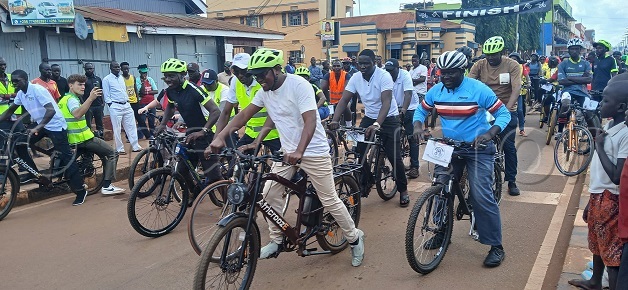Jinja to pilot pedestrianisation with Nizam Road car-free plan
“This is about giving Jinja back to its people because in a car-free zone we envision a cleaner, safer and more vibrant city where pedestrians, cyclists and small businesses can thrive without the noise and congestion of traffic,” Kasolo said.
Jinja mayor Alton Peter Kasolo Okocha (left) with Patrick Kayemba of FABIO centre and Charles Nyapendo, the city planner during the World car-free day celebrations. (Photos by Doreen Musingo)
________________
In a move aimed at reshaping Jinja’s urban landscape, mayor Alton Peter Kasolo Okocha has formally proposed converting Nizam Road, one of the city’s busiest streets, into a car-free pedestrian zone.
Kasolo said the plan aligns with Jinja’s broader goals of promoting green urban spaces, reducing carbon emissions and positioning the city as a leading eco-tourism destination in East Africa.
He explained that Nizam Road’s congestion and busy commercial activity make it suitable for pedestrianisation, as clients would be able to move freely between different market catchment areas. The plan is intended to revitalise the city centre, boost trade, strengthen tourism and improve pedestrian safety.
“This is about giving Jinja back to its people because in a car-free zone we envision a cleaner, safer and more vibrant city where pedestrians, cyclists and small businesses can thrive without the noise and congestion of traffic,” he said.
The proposal was unveiled as Jinja city joined the rest of the world in marking World Car Free Day, an annual event that challenges car dominance in urban centres and promotes cycling, walking and other non-motorised transport.
The celebration, usually held on September 22, but marked in Jinja on Sunday, September 21, 2025, was organised by city authorities in partnership with the First African Bicycle Information Organisation (FABIO) and Coop-Africa.

Kasolo directed speaker Benard Mbayo, who was also present, to prioritise the matter in the next council meeting agenda. If approved, the initiative would become Jinja’s first pedestrian-only street and a significant shift in the city’s approach to urban planning and public space.
“Making Nizam Road a permanently car-free zone by December 2025; that will be my gift to this year’s Car Free Day,” he said, adding that the city intends to institutionalise the event by holding it quarterly.
During the celebration, Iganga Road and Main Street from Clive Road to Bank of Africa were closed off for various activities. Kasolo, who led a peaceful cycling race, said the event sent a powerful message of inclusion.
"Cities are built for people, not only for cars. There are many residents who cannot afford vehicles, but they, too, deserve to enjoy the city. The event shows how making streets safe for cycling and walking gives everyone equal access to urban life,” he said.
During the tenure of former mayor Majidu Batambuze, Nizam Road had previously been approved as an evening market street where food vendors were allowed to operate.
Patrick Kayemba of FABIO said when the organisation first introduced Car Free Day in 1999, cycling was sidelined as an activity considered unsuitable for central business districts. Today, however, it is widely recognised as key to sustainability.
He added that FABIO’s advocacy played a role in Uganda’s adoption of the Non-Motorised Transport (NMT) Policy in 2013, which guides urban infrastructure development.
“Cycling is not a luxury but a necessity, particularly for those who cannot afford cars,” he said.
"Cities are not meant for vehicles alone, they are also meant for People with disabilities, the elderly, students, vendors, among others. Cycling gives all of them access to the city,” he added.
Marieke De Wild of Coop-Africa described the event as a milestone, noting it was the first time Jinja officially hosted Car Free Day after signing a memorandum of understanding earlier in the year.
"In Jinja, most people walk or cycle, but 80 percent of road space is given to cars. That imbalance needs to change,” she said.
Students also voiced support for the initiative. Muhammad Mutale, a student at Jinja SS, said many learners rely on bicycles to get to school but face constant risks from reckless drivers.
"Cycling helps us keep time and stay healthy, we ask the city authorities to create safe routes so that students like us can ride without fear.”
Brenda Namirembe, a local university student, also welcomed the proposal, saying a calm and open street would be more attractive than the current congestion caused by cars and boda bodas.
However, some business owners expressed concern about the plan. They fear that restricted vehicle access could affect deliveries and customer flow.
“We depend on quick access for both deliveries and customers. If the plan doesn’t include alternatives, it might hurt small businesses,” said shopkeeper Sam Okello.